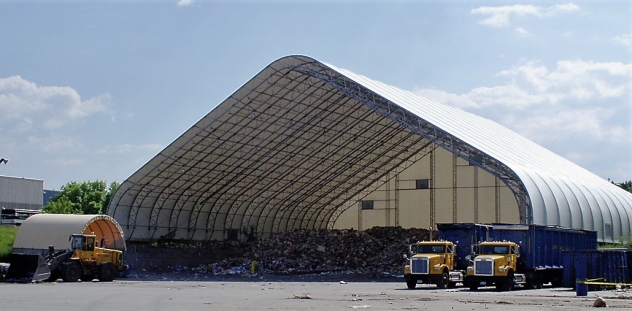THE CONSTRUCTIONIST.

NOV
15
WASTE TRANSFER STATIONS
What is a Waste Transfer Station?
A waste transfer station is an industrial facility that can be small to quite large in size, where solid waste is temporarily housed before it is sent to a landfill or waste-to-energy facility. These stations are fully enclosed, especially when located in an urban area. Transfer stations can also sometimes be co-located with a material recovery facility, which is a specialized plant that receives, separates and prepares recyclable materials for marketing to end-user manufacturers. Activities at a transfer station include receiving, weighing, unloading garbage dump trucks, pre-screening and removal of items that were wrongfully disposed of, compacting the waste, and finally reloading onto larger vehicles to be transported to the final destination.
Key Benefits of a Transfer Station
A transfer station plays an important role in making solid waste transportation more cost-effective. This is because waste is transferred from local collection vehicles to larger transport modes such as large trailers, trains or barges. By doing so, the cost of transportation to disposal sites that are more distant can by reduced significantly. In turn, this also can give crews and other vehicles more time for other collection activities which may also be cost effective. Here are other main benefits of transfer stations:
- Prevents hazardous waste and other materials such as recyclables from entering landfills
- Less pollution due to fewer vehicles needed for transporting waste
- Fuel savings
- Reducing traffic congestion in cities and communities
- Provides commercial and residential customers a local trash and recycling facility to use
The Basics of Transfer Station Operations
1. Arrival and Scale house
When inbound vehicles arrive at the transfer station they are first directed to the scale house. The vehicles are weighed with the full load. Upon exiting the transfer station, vehicles will be re-weighed and charge based on the amount of waste dropped off.
2. Unloading and Processing
Vehicles are directed to a specific area of the transfer station. Solid waste is dropped off on the floor and sorted efficiently to remove the amount of waste that is ultimately transported to landfill. During this process, transfer station employees will screen the waste for any incorrect items or hazardous waste. Another process that occurs at a transfer station is sorting of waste for recycling. At Draglam Waste transfer stations, we ensure that all recyclables are properly sorted including cardboard, wood, iron and plastics. Our company’s recycling strategies significantly reduce the amount of waste going to landfills and help support our customers in their recycle and re-use efforts.
3. Transfer Station Facility
The transfer station includes a scale house location and an enclosed structure where waste dumping and transfer take place. The property will require enough space for multiple large vehicles to move around each other and form long lines when needing to pass through the scale. There should also be ample space for addition parking for both staff and transfer trailers. There would also need to be an area for staging of unacceptable items that were removed during the screening process.
4. Staffing
Waster transfer stations require a variety of employees. Customer service and dispatch who take orders and inquires over the phone play an important role in overall service quality. Scale house operators, traffic controllers and equipment operators are other types of employees at transfer stations. Typically there would also be mechanics for maintenance and management overseeing the operations.
Visit http://www.draglamwaste.com to find one of our convenient Draglam Waste transfer station locations and to learn more about waste removal & recycling.
FIND A LOCATION NEAR YOU
BY POSTAL CODE
KMBY CITY















